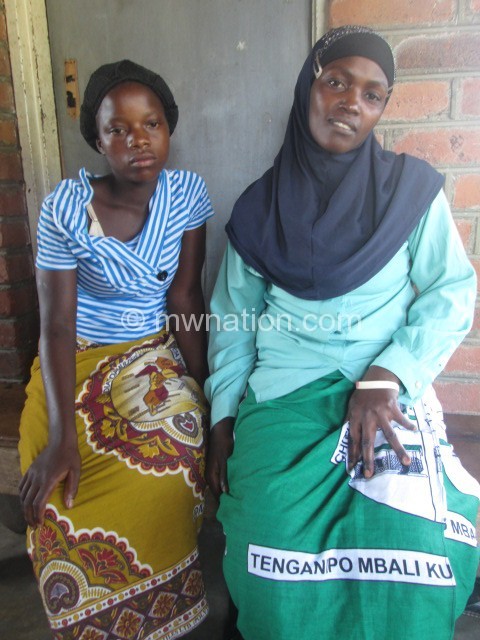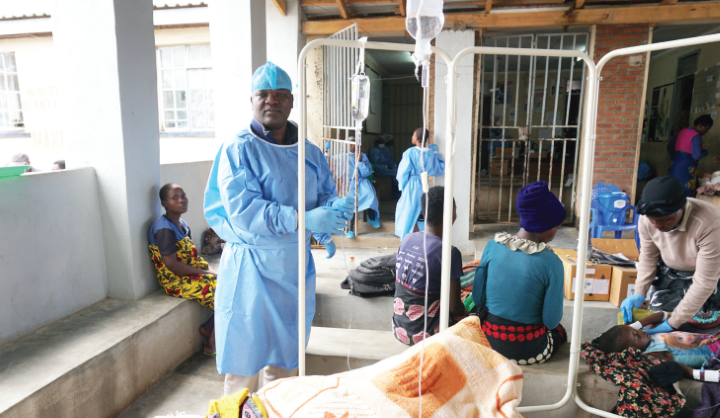Empowering youths with reproductive health rights
Close to the Mozambican border at Nayuchi in sub-Traditional Authority (sub-T/A) Nchinguza in Machinga, young people have been mobilised into youth clubs and teen mother clubs by Youth Response for Social Change (YRSC), a local community-based organisation. Through these clubs, the youth go across villages in the district to raise awareness on benefits of family planning and the need to curb early marriages and unintended pregnancies.
With support from Southern Africa Aids Trust (SAAT), YRSC aims at ensuring that youths have correct information on reproductive health rights to improve their well-being.

Chikondi Chimeta is an 18-year-old girl who belongs to Kachere Youth Club. She got pregnant at 17 while in Form Three at Dzaone Private Secondary School at Ntaja Trading Centre. As a result, she dropped out of school. But after delivering her baby, she joined the club to add her voice on dangers of unintended pregnancies and educating communities on family planning and sexual reproductive health rights.
“After my experience, I have now taken up the role of educating and sensitising youths on early and unintended pregnancies. When girls get married early, there is a risk of early pregnancies which may result in obstetric fistula,” explains Chimeta.
She says the knowledge she has gained through capacity building provided by YRSC on youth and sexual reproductive health and rights has changed her life. She plans to return to school in September this year and complete her secondary education so as to become a nurse.
She also recalls a scenario in the community where many girls are abandoned by the men responsible, thereby they suffer to bring up the kids alone without any financial support.
According to the 2014 Human Rights Watch Malawi report on child marriage, victims of child marriage face many barriers in getting help from authorities. Many girls and women do not know what their rights are under the law, or do not know where to look for assistance other than from their own families or traditional authorities, who often fail them.
Human Rights Watch notes that these problems are compounded and perpetuated by poor coordination among government agencies responsible for responding to violence against women; little or no monitoring of cases handled by officials from these agencies; negligent and dismissive police responses to reports of violence against women; lack of infrastructure, resources, and well-trained personnel in the justice system; and widespread and deep-seated discriminatory attitudes towards women. Moreover, Malawi does not have sufficient specialized safe spaces where victims of forced marriage and other gender-related abuses can find shelter and protection.
Lony Moffat is a 26-year-old woman from Nayuchi in the area of group village headman Pondelani. She is a member of Nsikizi Teen Mother Club. She agrees with Chikondi that many girls are affected by early marriages and unintended pregnancies in the area, hence a need to scale up civic education and awareness on sexual reproductive health and rights.
“I remember in 2014, we went to a certain village of Jamisoni and intervened to stop an early marriage. A 14-year-old girl, an orphan got married to a 15-year-old boy, the traditional leaders came in and terminated the marriage immediately,” narrates Moffat.
She stresses on the need to educate communities on the importance of consistent condom use to reduce unintended pregnancies and HIV transmission. The club member also discloses that more people are becoming aware on the need to use various family planning methods unlike in the past.
“In the past people were resisting condom use, but now we see a lot of people during our community sensitization campaigns demanding family planning commodities such as condoms. It is important to always provide information to the young people to scale up family planning and reproductive health rights,” she indicates.
In Malawi, the general fertility rate in 2008 was 173 births for every 1 000 women in the reproductive group of 15-49 while in Machinga it stood at 192. The total fertility rate (TFR) in the district is 6.1 children per woman, slightly higher than the national average of 5.7, according to the 2008 Housing and Population Census.
The government’s blueprint for development, the Malawi Growth and Development Strategy II (MGDS) 2011-2016, promotes gender equality and gender mainstreaming in all sectors. In practice, however, women’s rights in Malawi remain largely curtailed.
Malawi is ranked 124 out of 148 countries in the 2012 UN Gender Equality Index. Patriarchal beliefs and attitudes, many of which are harmful to human rights, still prevail and shape the lives of women and girls.
As the world awaits the adoption of Sustainable Development Goals in September this year, reproductive health rights for youth in Malawi need to remain a priority if the country is to make progress.





